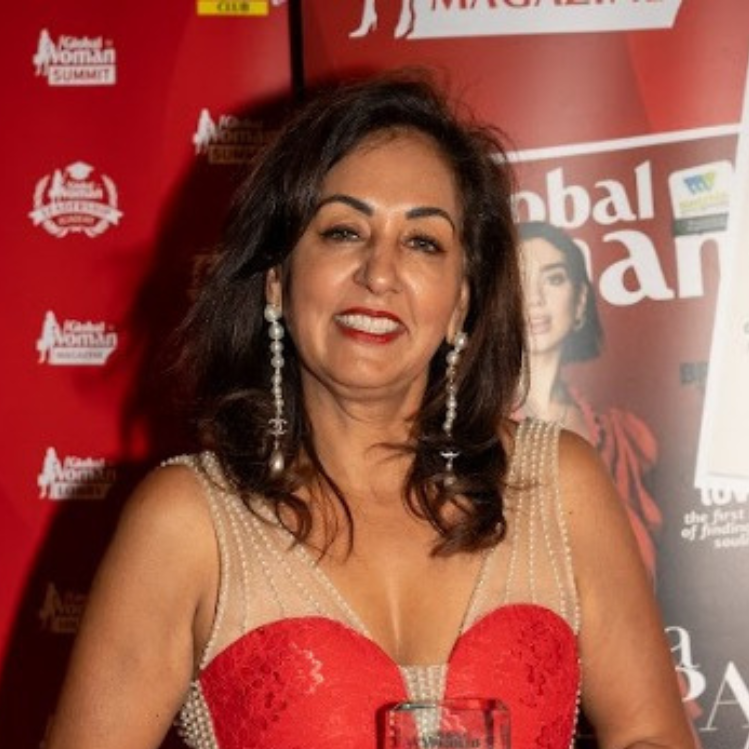
How One Coach Shapes Leaders and Lifts Women Worldwide
Meet Rita Chowdhry, an internationally acclaimed coach and certified advanced DISC trainer renowned for her expertise in learning and development across diverse sectors. With over 38 years of experience, Rita has become a trusted authority, guiding entrepreneurs, CEOs, and frontline staff alike toward success. Beyond traditional coaching, Rita’s approach emphasizes empowerment, particularly for women in the workplace, helping them secure promotions, awards, and leadership roles. Her dedication extends to underrepresented groups, reflecting her passion for philanthropy. As the author of “Get Savvi,” Rita’s profound insights have garnered national press recognition and left an indelible mark on countless individuals seeking personal and professional growth.
Throughout your extensive career in learning and development, what motivated you to specialize in leadership and team development for entrepreneurs, CEOs, and frontline staff?
I am motivated by helping people of all levels reach full potential and at the heart of improving performance, profits, engagement and well-being of staff, leadership and team cohesion is at the fore-front. If an organisation can cultivate strong leadership that invests in the harmony of the team, performance and profits will reflect that. People represent an organisation’s most valuable asset, and it falls upon leaders to nurture and cherish that asset.
Research conducted by socialworkplace.com highlights a critical insight: 75% of individuals leaving their jobs attribute their departure to dissatisfaction with their bosses rather than the job itself. This impact that leadership has on employee retention and overall organisational success is something employers cannot afford to ignore
Recognising this, I have focused my efforts on working with leaders at all levels to cultivate environments where employees feel valued, supported, and motivated to excel. By empowering entrepreneurs, CEOs, and frontline managers with the necessary skills and strategies for effective leadership and team collaboration, we can create a ripple effect throughout the organisation.
Central to our method is recognising that exceptional teams don’t just happen; they’re carefully developed. We guide this journey by aiding teams in appreciating each other’s strengths, embracing diversity, and equipping them with the means to handle any conflicts that may arise from their varied personalities.
Can you share a particularly impactful moment or project where you felt your coaching made a significant difference in the success of an individual or business?
At an organisational and community level a A huge accomplishment was to win a contract to coach 300 Black Asian and ethnic minority metropolitan police officers, which led to policy and strategy change. The results not only affected the recruitment, retention, and career progression of BAME officers, but the entire police force, and subsequently the 9.32 million population of London that the MET serves, it was truly an a privilege to work on a project that had such a prolific impact on community.
Another impactful project has been working with a healthcare provider to transform and restore team cohesion, Through the SAVVI programme (my unique approach to coaching and training model). Initially marred by strained relationships, three team members were on the brink of resigning. However, with focused coaching and team-building efforts, the team not only enhanced their communication and problem-solving abilities but also fostered a stronger sense of trust and camaraderie. This transformation enabled them to generate innovative solutions and achieve significant business outcomes such as their first-ever Care Qualities Commission ‘Outstanding Rating’.
Your commitment to empowering women in the workplace is commendable. Could you elaborate on how your coaching approach specifically addresses the unique challenges faced by female clients?
My coaching approach stems from my trademarked ‘SAVVI’ framework. SAVVI is an acronym that stands for self-awareness, achiever’s mindset, values & beliefs, verbal communication, and inspire & motivate.
Enhancing my client’s self-awareness forms the foundation for our coaching relationship. Women often doubt themselves on whether they deserve a promotion or a seat at the board table. Through coaching, they can exploit these strengths and learn ways to address their areas of development. This has a profound effect on boosting their confidence and combatting imposter syndrome. It also enables them to prepare for salary negotiations, ensuring their voices are heard and paving the way for career advancements.
Through the SAVVI framework, I help my clients develop their leadership skills, create a strong personal brand, navigate work-life balance, address gender bias and stereotyping, enhance resilience and emotional intelligence, and networking and mentoring opportunities.
As a keen philanthropist, how do you integrate your passion for supporting underrepresented groups into your coaching practice?
Integrating my commitment to supporting underrepresented groups into my coaching practice is not only a priority for me and is a deeply fulfilling aspect of my work. One of the ways I do this is by offering pro bono coaching sessions to individuals from underprivileged backgrounds and underrepresented groups. Those interested can apply through the savran.co.uk website or reach out to me directly if they are brought to my attention through other channels.
Currently, I am actively coaching underprivileged female students in India, each with their unique aspirations and challenges. One remarkable young lady I’m working with has set her sights on attending an Ivy League university. Despite facing significant financial obstacles, she demonstrates remarkable determination, balancing her studies with part-time work for a charity to support her family. It’s truly inspiring to witness her resilience and drive towards achieving her goals.
In addition to my work in India, I’ve also dedicated many years to coaching underprivileged students in the UK, particularly through programmes such as Uprising programme. These initiatives focus on developing leadership skills among young people from disadvantaged backgrounds, empowering them to become future leaders in their communities.
By combining my coaching expertise with my passion for philanthropy, I strive to help these individuals realise their full potential and create positive change in their lives and communities. It’s a privilege to play a role in their journey towards success and fulfilment, and I am committed to continuing this important work for years to come.

Your book, “Get Savvi,” has garnered acclaim for its insights into self-development. What inspired you to write this book, and what key messages do you hope readers take away from it?
The inspiration behind the book, “Get Savvi,” stemmed from a desire to share my journey of personal and professional transformation, along with the valuable insights and techniques I’ve gathered throughout my career as a coach. I wanted to reach a wider audience, including those who may not have access to coaching or training resources.
“Get Savvi” is not just a collection of theories; it’s a compilation of real case studies from my clients, demonstrating the transformative power of self-development. I aimed for readers to truly connect with the real individuals in the book, leaving them pondering: “If that person can do it, so can I”. I aimed to provide readers with practical tools and techniques that they can apply in their own lives, whether it’s having the confidence to have a career change or setting personal goals such as creating a healthier lifestyle.
Accessibility was a key consideration in writing “Get Savvi.”and therefore I wanted to ensure the book is available in both print and audio formats. . My ultimate goal is for readers to walk away from “Get Savvi” feeling empowered, inspired, and equipped with the knowledge and tools they need to embark on their journey of self-discovery and growth.
In your experience, what are some common misconceptions or challenges individuals face when seeking personal and professional growth, and how do you address these in your coaching sessions?
A common misconception is the belief that growth requires a complete overhaul of one’s life or career, which can be overwhelming and discouraging. Additionally, individuals may struggle with self-doubt or fear of failure, hindering their progress.
In my coaching sessions, I address these challenges by emphasising incremental progress and the power of small steps toward achieving larger goals. I help individuals identify and challenge limiting beliefs, fostering a growth mindset and resilience in the face of setbacks. Through tailored guidance and support, encouraging clients to embrace their strengths, confront their fears and take action toward meaningful growth and development.
Additionally, many struggle with imposter syndrome, doubting their abilities and feeling unworthy of success. I have always been a firm believer in the ancient saying, “Knowing others is intelligence. Knowing yourself is wisdom.” The first step to personal development is having self-awareness. Psychologist, Tasha Eurich, shared that 95% of people think they are self-aware when in actuality, only 10% – 15% are. This explains why many encounter challenges in their lives: feeling adrift and stagnant, lacking direction or purpose, grappling with overwhelming stress, or experiencing a sense of dissatisfaction despite ‘having it all’.
In coaching, the first step to becoming ‘SAVVI’ is having self-awareness, which opens doors for my clients to explore their unique traits and unearth the root causes of their present challenges.
In coaching sessions, I address these challenges by fostering a supportive and non-judgmental environment where clients feel safe to explore their beliefs and aspirations. I emphasise the importance of setting realistic goals and celebrating progress, no matter how small. Through techniques such as cognitive reframing and positive affirmations, I help clients overcome limiting beliefs and cultivate self-confidence. It’s crucial to cultivate an “I can” attitude to navigate through everyday life. Part of this journey involves embracing a mindset geared towards achievement, what we call an ‘Achiever’s Mindset’. Setting and achieving goals plays a pivotal role in this transformation.
Overall, my approach to coaching addresses common misconceptions and challenges by unlocking self-awareness, resilience, and a growth mindset. By empowering individuals to overcome barriers and tap into their full potential helping them achieve sustainable personal and professional growth.
As a certified advanced DISC trainer in psychometric profiling, how do you incorporate these assessments into your coaching practice to enhance self-awareness and personal development for your clients?
I use DISC as a foundational tool to provide my clients with a detailed understanding of their motivators, stressors, strengths, areas of development and communication styles.
The assessment, which takes only 10 minutes to complete online, createsa comprehensive 18-page report of their profile, which includes invaluable insights into personality traits and preferences. This report is then used in an initial breakthrough coaching session, where I conduct an in-depth interpretation, during which we explore their DISC profile in detail.
This session opens up avenues for my clients to explore how their profile influences their interactions with others and their approach to various situations. By examining patterns in their behaviour, they gain a deeper understanding of themselves, fostering greater self-awareness in the process.
With these insights at hand, I then tailor my coaching strategies to align with each client’s unique DISC profile. For example, clients with dominant (D) personalities, much like former UK Prime Minister, Margaret Thatcher, will come across as quite direct and assertive, but may not realise that their approach tends to be received quite aggressively by others. Those with supportive (S) personalities, similar in personality to Princess Diana, are loyal, reliable and stable but may tend to avoid confrontation and not react well to sudden changes in their lives.
One of the most significant benefits of DISC assessments lies in their ability to build strong communication skills. I work closely with my clients to improve their communication skills and interpersonal relationships. This often involves practicing active listening, adapting communication styles to suit different personalities, and resolving conflicts constructively.
Furthermore, armed with a deeper understanding of their behavioural tendencies, my clients and I collaboratively set goals and develop action plans for their personal and professional development. By aligning these goals with their DISC profile, clients are better equipped to leverage their strengths and overcome potential challenges.
Throughout the coaching journey, I provide ongoing support and feedback, using the DISC profile as a reference point for growth and improvement. Regular check-ins allow us to assess progress, refine strategies, and address any obstacles that may arise.
In essence, by incorporating DISC assessments into my coaching practice, I empower my clients to gain deeper self-awareness, optimise their interpersonal skills, and unlock their full potential for personal and professional growth.
Could you share a specific example of how your coaching has helped a client overcome obstacles and achieve their goals, particularly in the context of leadership development?
I’ve had the privilege of witnessing the profound impact my coaching has had on both individuals and organisations. A standout example is a client who held the position of Head of Communications & Customer Experience at a Borough Council. She was appointed to a managerial position and needed support to enhance her team performance and manage her work life balance with two young children. She wanted to ensure her work was noticed and had an impact on the community she served. With the support of executive coaching, she achieved remarkable progress including; being promoted three times, achieving her Level 6 Chartered Institute of Marketing qualification, taking on the role of a Food Bank Trustee and frequently participating as a panel speaker. I watched her confidence soar as she reached these achievements and it was truly rewarding. Her improved time management skills and ability to navigate workplace conflicts were commendable. Her successes culminated in a highly successful salary negotiation, reflecting her increased value to the organisation.
Your work has earned recognition in the national press. How do you believe your visibility in the media has contributed to your mission of empowering individuals and businesses?
Being recognised in the national press has had a significant impact. For instance, my article on “World’s Best CV” led to an interview on Australia’s Breakfast TV programme, expanding my reach and raising awareness of my work on an international scale. Similarly, articles like “Benefits of Running a Family like a Business” featured in UK tabloid press have helped to showcase practical strategies for empowerment in everyday life. The media exposure has enhanced my credibility and trustworthiness but also served as an inspiration for others, motivating them to pursue their own goals and dreams. Moreover, it has facilitated networking opportunities and collaborations with like-minded individuals and organisations, enabling collective efforts toward empowerment. Through media platforms such as Diversity Q, I’ve advocated for important causes such as diversity and inclusion, amplifying my voice and driving positive change. mMedia visibility has been instrumental in advancing my mission, empowering individuals and businesses to realise their full potential and make a meaningful impact in their communities.
Looking ahead, what are your aspirations and goals for the future of your coaching practice, and how do you plan to continue making a positive impact in the lives of your clients and the wider community?
In the future, I aim to empower a broader audience. Additionally, I’d like to focus on fostering a supportive community among clients, encouraging collaboration and shared learning. Giving back remains a priority, with continued pro bono coaching and charitable initiatives to uplift underserved individuals and organisations. My goal is to make a lasting positive impact on clients’ lives and the wider community. Ultimately, I strive to create happier, more productive workplaces with cohesive teams and empower people to lead with empathy and inclusivity to ensite change.

APPLY TODAY
100 Top Global Women Entrepreneurs – Global Woman Magazine
Our Journey in 12 Months:
Our Journey in 12 Months – Global Woman Magazine
5 Things That Show Money is Not Evil:
5 Things to Show That Money Is Not Evil – Global Woman Magazine
Global Man Magazine Page:
Global Woman, Global Man: Socials:
Global Woman Magazine (@global_woman.magazine) • Instagram photos and videos





